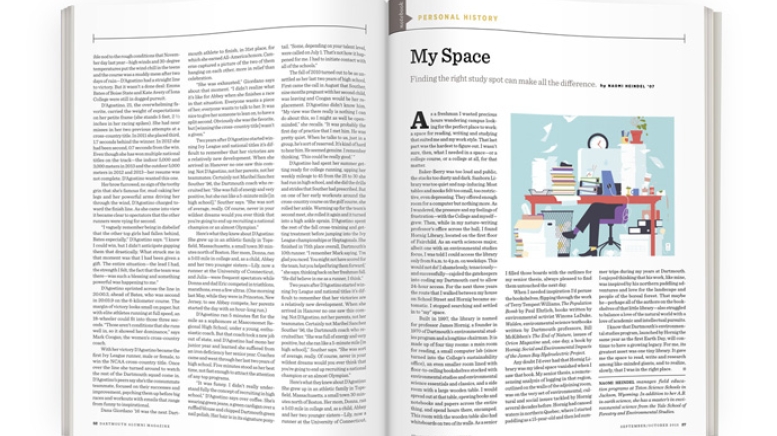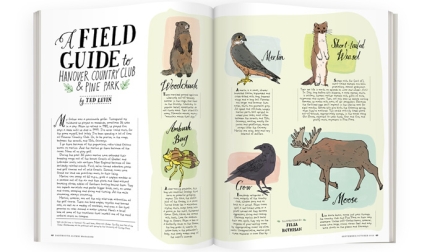As a freshman I wasted precious hours wandering campus looking for the perfect place to work: a space for reading, writing and studying that suited me and my work style. That last part was the hardest to figure out. I wasn’t sure, then, what I needed in a space—or a college course, or a college at all, for that matter.
Baker-Berry was too loud and public, the stacks too dusty and dark. Sanborn Library was too quiet and nap-inducing. Most tables and nooks felt too small, too restrictive, even depressing. They offered enough room for a computer but nothing more. As I wandered, the pressure and my feelings of frustration—with the College and myself—grew. Then, while in my nature-writing professor’s office across the hall, I found Hornig Library, located on the first floor of Fairchild. As an earth sciences major, albeit one with an environmental studies focus, I was told I could access the library only from 8 a.m. to 4 p.m. on weekdays. This would not do! I shamelessly, tenaciously—and successfully—cajoled the gatekeepers into coding my Dartmouth card to allow 24-hour access. For the next three years the route that I walked between my house on School Street and Hornig became automatic. I stopped searching and settled in to “my” space.
Built in 1997, the library is named for professor James Hornig, a founder in 1970 of Dartmouth’s environmental studies program and a longtime chairman. It is made up of four tiny rooms: a main room for reading, a small computer lab (since turned into the College’s sustainability office), an even smaller room lined with floor-to-ceiling bookshelves stocked with environmental studies and environmental science essentials and classics, and a side room with a large wooden table. I would spread out at that table, spewing books and notebooks and papers across the entire thing, and spend hours there, encamped. This room with the wooden table also had whiteboards on two of its walls. As a senior I filled those boards with the outlines for my senior thesis, always pleased to find them untouched the next day.
When I needed inspiration I’d peruse the bookshelves, flipping through the work of Terry Tempest Williams, The Population Bomb by Paul Ehrlich, books written by environmental activist Winona LaDuke, Walden, environmental science textbooks written by Dartmouth professors, Bill McKibben’s The End of Nature, issues of Orion Magazine and, one day, a book by Hornig: Social and Environmental Impacts of the James Bay Hydroelectric Project.
Any doubt I’d ever had that Hornig Library was my ideal space vanished when I saw that book. My senior thesis, a remote- sensing analysis of logging in that region, outlined on the walls of the adjoining room, was on the very set of environmental, cultural and social issues tackled by Hornig several decades before. Hornig had canoed waters in northern Quebec, where I started paddling as a 15-year-old and then led summer trips during my years at Dartmouth. I enjoyed thinking that his work, like mine, was inspired by his northern paddling adventures and love for the landscape and people of the boreal forest. That maybe he—perhaps all of the authors on the bookshelves of that little library—also struggled to balance a love of the natural world with a love of academic and intellectual pursuits.
I know that Dartmouth’s environmental studies program, launched by Hornig the same year as the first Earth Day, will continue to have a growing legacy. For me, its greatest asset was one tiny library. It gave me the space to read, write and research among like-minded giants, and to realize, slowly, that I was in the right place.
Naomi Heindel manages field education programs at Teton Science Schools in Jackson, Wyoming. In addition to her A.B. in earth science, she has a master’s in environmental science from the Yale School of Forestry and Environmental Studies.




